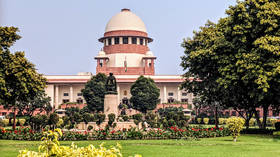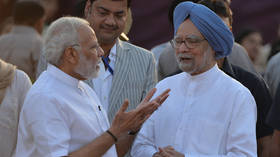India’s top court scraps funding for political parties as elections loom

India’s Supreme Court on Thursday abolished a six-year-old scheme that permitted individuals and companies to donate money to political parties anonymously and without limits.
The electoral bonds system, introduced by Prime Minister Narendra Modi’s Bharatiya Janata Party (BJP)-led government in 2018, was deemed “unconstitutional” and violated citizens’ right to information, according to the court.
The judgment, delivered just months ahead of the general elections, will impact major political parties, including the ruling BJP, which, according to Indian media reports, has been the primary beneficiary of the scheme.
“Information about funding of political parties is essential for the effective exercise of the choice of voting,” Chief Justice Chandrachud said in his judgment.
Notably, the judges remarked that political contributions provide “a seat at the table” for donors, which translates to “influence over policy making.” The court highlighted concerns about potential quid pro quo arrangements due to the close association between money and politics.
Under the electoral bonds scheme, individuals or companies could purchase bonds from the State Bank of India (SBI) and donate them to a political party. The system has faced legal challenges since it was introduced, with opposition and civil society groups suggesting it obstructed the public’s right to transparency regarding political donations.
On Thursday, the five-judge Constitution Bench ordered the SBI to immediately stop issuing the bonds. The bench also quashed the amendments made to the Income Tax Act and the Representation of People Act, which made the donation anonymous.
Notably, the SBI was ordered to furnish details of the electoral bonds received by political parties to the Election Commission of India by March 6. The commission will subsequently publish such details on its official website by March 13. Electoral bonds that have not yet been encashed by political parties must be returned, after which the issuing bank will refund the amount to the purchaser’s account.
The Supreme Court also reinstated corporate donation limits that had previously been abolished, stating that treating companies and individuals equally in this context was “manifestly arbitrary.”
The court emphasized that companies wield greater influence over the electoral process through political contributions compared to individuals, characterizing such contributions as business transactions aimed at securing benefits in return.
The Modi government had earlier defended the policy, arguing that it curbed the use of cash or “black money” in political funding and offered donors a confidential avenue to contribute to any party’s funds. According to a report in The Hindu newspaper, citing one of the petitioners in the case, the Association for Democratic Reforms (ADR), the BJP received nearly 90% of the 6.8 billion rupees (around $82 million) in corporate donations to the five national parties in the last financial year.
Between March 2018 and November 2023, according to ADR, individuals and companies purchased bonds worth 159 billion rupees ($1.9 billion).
Where India Meets Russia – We are now on WhatsApp! Follow and share RT India in English and in Hindi













